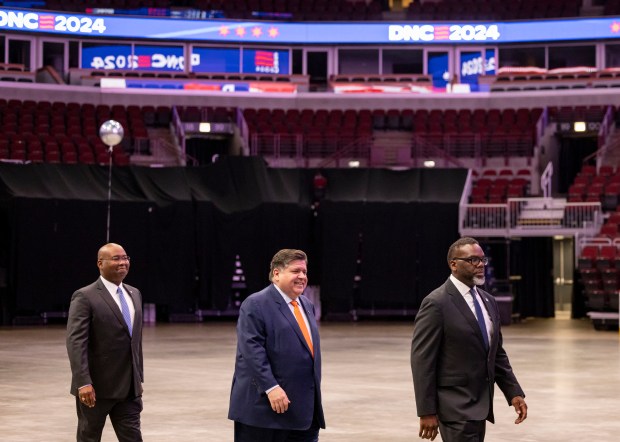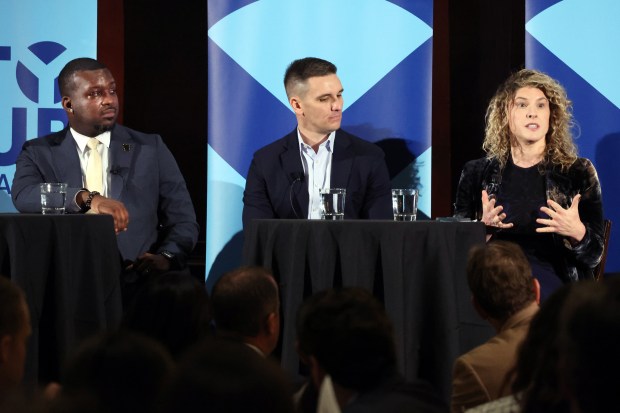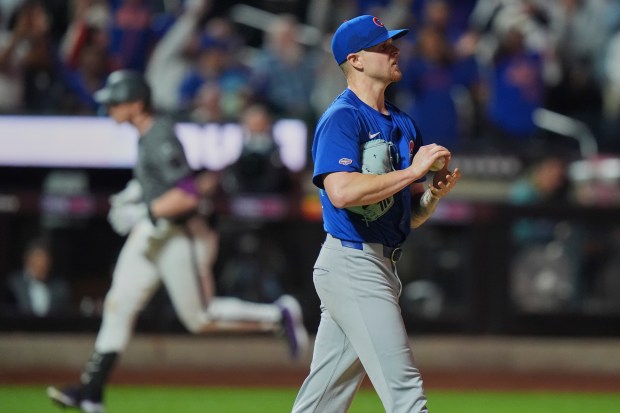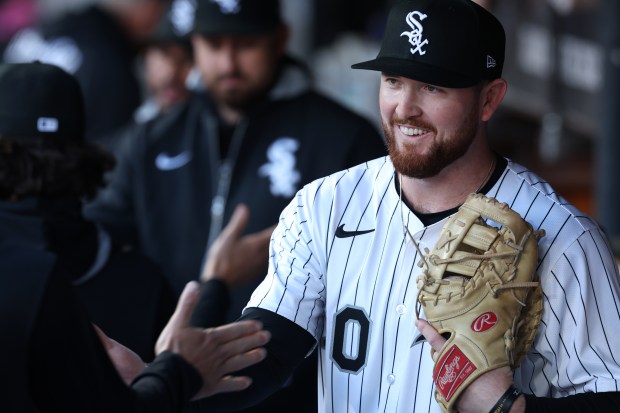Hours before Gov. JB Pritzker suffered a rare defeat in Springfield over a hemp bill opposed by Mayor Brandon Johnson, the governor’s chief of staff withdrew from a short-lived effort to convene with Chicago and Cook County counterparts to plan for President Donald Trump’s second term.
On Jan. 6, Anne Caprara sent a curt email informing the chiefs of staff to the mayor and Cook County Board president that she was opting out of their “scenario planning” meetings organized shortly after Trump’s November win.
“I won’t be participating in these meetings going forward,” Caprara wrote in the exchange obtained by the Tribune via an open records request, adding that she intended to later “catch up separately” with County Board President Toni Preckwinkle’s chief of staff.
The three chiefs of staff had met twice in December, the emails indicate, and were planning their next session for mid-January until Caprara’s email appeared to cut out Johnson’s chief of staff, former state Sen. Cristina Pacione-Zayas.
About two hours later, Springfield’s lame-duck session adjourned with no action taken on the Pritzker-backed legislation to crack down on hemp sales, effectively killing it.
Caprara’s note serves not only as another indication Pritzker was chapped at Johnson for working against the governor’s hemp tax proposal, but also portends that conflict could persist between the two Democratic leaders as they try to repel the Republican president’s agenda and tackle other issues facing both the city and state.
At the time of Caprara’s email, the strained relationship between the governor and mayor was hardly a secret, but public criticism was restrained. That changed the next day when the governor slammed Johnson, suggesting the mayor’s opposition to the hemp bill was a symptom of broader issues, including poor communication.
“He doesn’t call very often,” Pritzker said of Johnson. “Maybe in the time that he’s been mayor, he’s called me, perhaps, five times?”
The three chiefs of staff declined to comment about the dustup.
Sources in each of the three offices downplayed the import of the Trump planning sessions, suggesting the meeting was preliminary and that other departmental staff — including those responding to federal actions regarding immigration — are still in regular communication. The mayor did call the governor on Jan. 19 for his birthday, a city source close to the mayor said, but a follow-up meeting between all three chiefs has not been rescheduled.
The uneasiness between the two-term billionaire governor with rumored presidential ambitions who refers to himself as a “pragmatic progressive” and the rookie mayor who is the face of Chicago’s more left-wing progressive movement highlights some of the inherent tension among Democrats. Uncomfortably caught in the middle is Preckwinkle, the seasoned boss of the Cook County Democrats who prefers to hash out conflicts privately. By all accounts, she and her chief of staff, Lanetta Haynes Turner, maintain solid working relationships with both teams.
Ego matches between Chicago mayors and Illinois governors are so endemic “it’s almost a cliche,” said John Shaw, the director of Southern Illinois University’s Paul Simon Public Policy Institute, who has authored books on diplomacy.
Chicago’s longest-serving mayor, Richard M. Daley, often had challenging relationships with Illinois governors, even dubbing Republican Gov. Jim Edgar “Governor No” as the two fought over the future of Meigs Field, which is now Northerly Island, the construction of a domed stadium for the Chicago Bears and the Chicago Public Schools.
In more recent history, Mayor Lori Lightfoot’s failure to make nice with Pritzker dealt her a critical blow when state legislators voted for an elected school board bill that permanently stripped the mayor of control over Chicago Public Schools.
But given Illinois’ status as a Democratic stronghold, Shaw said Illinois is “likely to be at the epicenter” of federal disruption from the Trump administration. The most recent example came on Thursday, when Trump’s Department of Justice sued the state, Chicago and Cook County over their sanctuary policies limiting the ability of state and local police to assist federal law enforcement on immigration-related matters.
And in a legislative session that already promises to be challenging thanks to the state’s projected budget deficit, the conflict also complicates Johnson’s efforts to secure more state funding for his own budget and for CPS, as well as finding a shared solution to local transit agencies’ looming fiscal cliff — a key priority for Preckwinkle as well.
“The moment is too big, the challenges are too great for any of these leaders to harbor personal grudges or have personal acrimony or have some of their tense feelings filter down to the staff level,” Shaw said. “I mean, no one expects the governor and mayor to become lifelong friends or close political allies, but it’s imperative for the future of Illinois that they find ways to have a productive working relationship.”
Johnson allies have warned of political repercussions too, that the governor would be vulnerable in a Democratic presidential primary if he doesn’t repair his rocky relationship with Chicago’s Black mayor. But Pritzker’s people see little upside in engaging with a struggling mayor whose closest allies have been openly hostile to him, sources said.
Tension between the two leaders first bubbled up publicly during the migrant crisis. Under pressure to house thousands of people before the harsh Chicago winter, with busloads more arriving by the day, mayoral allies faulted the Pritzker administration for what they said was a lack of structural and financial help.
As demand for beds in the shelter system peaked in the fall of 2023, Ald. Carlos Ramirez-Rosa, then Johnson’s handpicked floor leader, accused Pritzker’s press shop of propagating a “bold-faced lie” about state efforts to provide shelter.
“I know why our mayor hasn’t gone out there and called the governor out,” the 35th Ward alderman said during an explosive City Council hearing. “But I will.”
In December 2023, the state nixed Johnson’s plan for a base camp for migrants in Brighton Park after the city declared it environmentally safe, with the two leaders pointing fingers over safety standards and communication. When Johnson announced plans to put the brakes on creating new shelters the following month, Pritzker said he was “deeply concerned.”
In February 2024, Johnson was cut out of a joint county-state news release pledging more than $250 million in additional funds for Chicago’s migrant response. Sources said the mayor had backed off from providing a remaining $70 million.
By the summer, migrant traffic had slowed. But a new source of tension emerged: the Democratic National Convention in August. The governor and mayor wrestled for control and credit before and after the blockbuster event, with Pritzker and allies winning out in a tiff over host committee leadership, and the two claiming credit for the event’s success when worries about out-of-control protests did not come to pass.

The enmity is partially driven by perception troubles, according to city, county and state sources.
Pritzker and his staff’s ambitions for higher office have contributed to self-importance and a hypersensitivity to criticism, some sources have said. Meanwhile, other sources have pointed to the belief that Johnson’s background in progressive organizing repels him from anything that looks like kowtowing. Combined with frequent personnel turnover, the sources claim that makes the mayor’s team disorganized and at times difficult to work with.
The dynamic between city and state under Johnson is also intertwined with the mayor’s close ties to the Chicago Teachers Union. After gaining momentum during the 2012 teachers strike and emerging as the progressive vanguard of the city, the labor organization primed Johnson to eventually win the mayor’s seat after decades of being shut out of City Hall’s fifth floor.
But so far having a friend on the inside has not made the CTU’s road to securing its next contract any easier. Breaking with their old playbook of challenging the mayor, union leaders last summer zeroed in on Pritzker, demanding he boost state funding for CPS and suggesting a bill on school closures that Pritzker supported was racist. He pushed back, doubling down in support of the bill and saying it is not the state’s job to “rescue” districts that burned through federal pandemic dollars.
Johnson’s team took to Springfield in early January to lobby against the hemp bill Pritzker publicly backed in December. The legislation sought to cap the amount of THC that hemp-derived products could contain and crack down on advertising that critics say was aimed at kids.
While sharing his concerns about child safety, the mayor’s team saw it as an attempt to regulate hemp as aggressively as marijuana — hobbling smaller stores that sell hemp-derived products — and make an end-run around Chicago’s authority to tax the product itself.
“Our communities require legislation that addresses concerns related to minor consumption, as well as opportunities for regulation that support entrepreneurs and municipalities,” Johnson later said in a release.
Johnson personally made calls to legislators to share his position, which was uncommon. Though the bill died after the city’s lobbying effort, Springfield insiders — and the governor— said the mayor shouldn’t claim full credit for tanking it.
Several House Democrats were already dissatisfied with the way social equity protections had played out for marijuana and shared Johnson’s concerns about the impact on small businesses.
But the hemp defeat did drive Caprara’s email, city and state sources told the Tribune, as well as Pritzker’s airing of broader frustrations about the city’s communication style and organizational disarray.
“With regard to his budget, literally, the last call that we got from them was in September, and then once in December, we, by the way, scheduled calls, and then they didn’t show up,” Pritzker said on Jan. 7.
City sources countered that budget officials did meet regularly, and Johnson pushed back hard against the suggestion he doesn’t work well with state officials.
“This notion that somehow I don’t have relationships in Springfield, well, they should actually go look at the true record,” Johnson shot back at a panel later that week. “I did not show up as mayor of Chicago, then had to build relationships. I built relationships to make it possible for me to become mayor of Chicago.”





